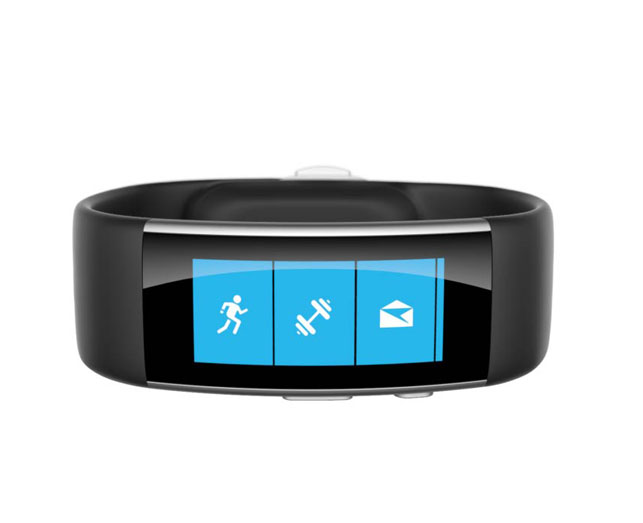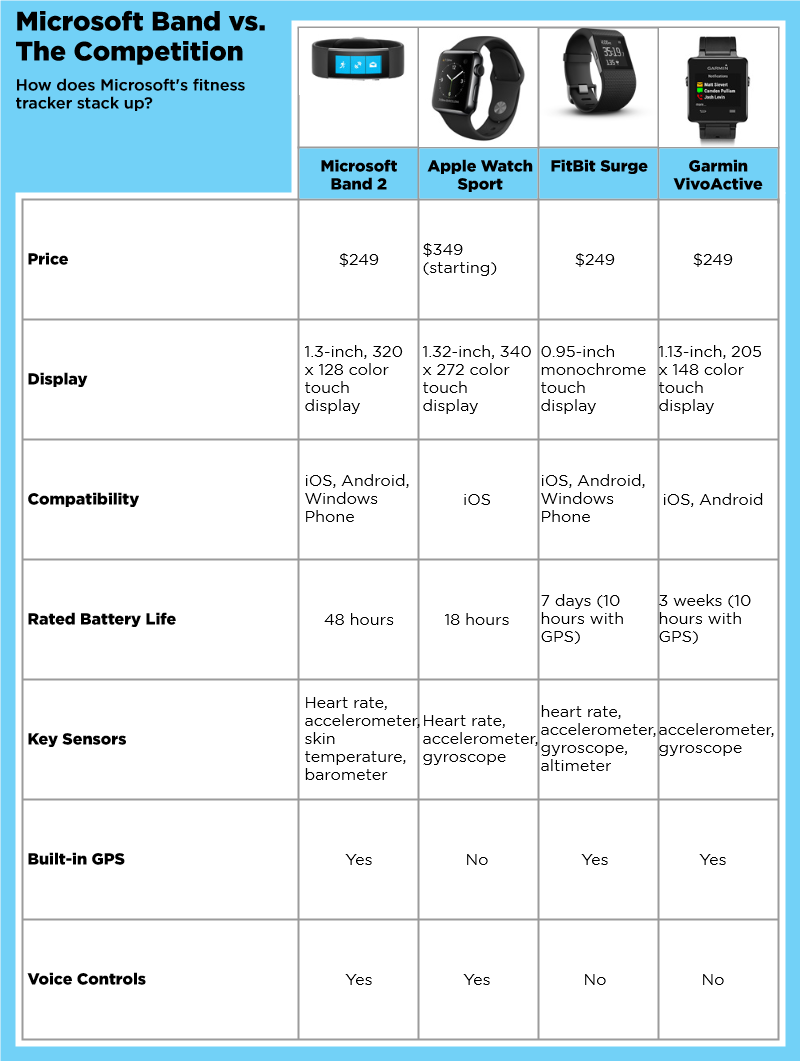Microsoft Band 2 vs. Apple Watch, Fitbit Surge and Garmin Vivoactive
Here's how the new Microsoft Band 2 stacks up to the Apple Watch, Fitbit Surge and Garmin Vivoactive.


The new Microsoft Band 2 is shaping up to be a vast improvement over its predecessor, featuring new tracking capabilities and a sleek, curvy design that leaves last year's awkward rectangular build in the dust. But while the new Microsoft Band 2 seems like a no-brainer for anyone upgrading from last year's model, how does it stack up to some of the best fitness trackers and smartwatches on the market?
Design
With the redesigned Band 2, Microsoft's wearable finally joins the "fitness trackers you'll actually want to wear" club. The watch's slim, curved touch display makes it unique compared to the boxy watch faces found on the Apple Watch and Garmin VivoActive, as well as the tiny, unobtrusive monochrome display on the Fitbit Surge. While the Microsoft Band 2's rubber wrist strap promises all-day comfort, you can't swap it out for other straps like you can on the Apple Watch and VivoActive. The Surge offers a choice of small, large or extra large straps, but they're also not swappable.
MORE: Best Fitness Trackers You Can Buy
Fitness Tracking
One of the Microsoft Band 2's key new features is its barometer, which can track your elevation when running, biking or climbing stairs. It also retains its predecessor's built-in GPS, a feature found on the Surge and VivoActive but not on the Apple Watch. Other than that, the Band 2 sports an accelerometer, gyroscope, heart-rate sensor and sleep-tracking capabilities, all of which are fairly common on fitness trackers.
Apps and Features
While the Microsoft Band can provide data to a variety of third-party health apps, its Microsoft Health that makes the wearable stand out. Microsoft's own fitness software allows you to track activities such as running and biking, and can even detect your golf swings to help you improve your game.
The Surge and VivoActive provide data to Fitbit's and Garmin's respective apps, but can also be used with third-party programs such as MyFitnessPal. The Apple Watch was once limited to Apple's own Health app, though its recent watchOS 2 update allows it to funnel fitness information to outside software.
Another key new Microsoft Band 2 feature is Cortana integration, which will allow you to compose text messages or check the weather using voice commands. The Apple Watch provides similar functionality via Siri, while the Surge and VivoActive lack voice controls. Microsoft also seems set on making the Band 2 as useful as a smartwatch as it is as a fitness tracker, with apps on the way from the likes of Uber, Twitter and Subway.
Sign up to get the BEST of Tom's Guide direct to your inbox.
Get instant access to breaking news, the hottest reviews, great deals and helpful tips.
Battery Life
Microsoft says the new Band 2 will last two days on a charge, but less with GPS active. While that doesn't quite measure up to the Fitbit Surge's estimated 7 days or the VivoActive's whopping 3 weeks, it's more than twice the Apple Watch's expected battery life of 18 hours.
Pricing and Compatibility
The Microsoft Band 2 will start at $249, which is the same price as the Surge and VivoActive. The Apple Watch starts at a pricier $349 for the Sport edition. Like the Surge, the new Microsoft Band will work with most iOS, Android and Windows Phone devices, while the VivoActive works with just iOS and Android. Naturally, the Apple Watch is currently limited to iOS users.
Outlook
With a wide range of sensors and a sleek new design, the Microsoft Band 2 has the potential to be one of the strongest fitness trackers on the market. It's cheaper than an Apple Watch, works with virtually any modern phone, and, with enough app support, could prove to be equally useful whether you're working out or trying to flag an Uber ride on the go. We'll have to spend more time with the new Band to see how it stacks up during real-world use, so stay tuned for our full review.
Mike Andronico is Senior Writer at CNNUnderscored. He was formerly Managing Editor at Tom's Guide, where he wrote extensively on gaming, as well as running the show on the news front. When not at work, you can usually catch him playing Street Fighter, devouring Twitch streams and trying to convince people that Hawkeye is the best Avenger.

